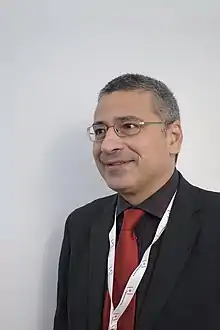Alessandro Vespignani
Alessandro Vespignani (born April 4, 1965) is an Italian-American physicist, best known for his work on complex networks, and particularly for work on the applications of network theory to the spread of disease, applications of computational epidemiology, and for studies of the topological properties of the Internet.
Alessandro Vespignani | |
|---|---|
 | |
| Born | April 4, 1965 |
| Alma mater | Sapienza University of Rome (PhD) |
| Scientific career | |
| Institutions | International Centre for Theoretical Physics Indiana University Northeastern University |
He is currently the Sternberg Family Distinguished University Professor of Physics, Computer Science and Health Sciences at Northeastern University,[1] where he is the director of the Network Science Institute. Vespignani is serving in the board/leadership of a variety of professional associations, institutions and journals. Vespignani is author, together with Romualdo Pastor-Satorras, of the book Evolution and Structure of the Internet. Together with Alain Barrat and Marc Barthelemy he has published in 2008 the monograph Dynamical Processes on Complex Networks.
Career and research
Vespignani received his undergraduate degree and Ph.D., both in physics and both from the University of Rome “La Sapienza”, in 1990 and 1993, respectively. Following postdoctoral research at Yale University and Leiden University, he worked at the International Centre for Theoretical Physics in Trieste for five years, and briefly at the University of Paris-Sud, before moving to Indiana University in 2004,[2] and then to Northeastern University in 2011.[3]
Vespignani has worked in a number of areas of physics, including characterization of non-equilibrium phenomena and phase transitions, computer science, network science and computational epidemiology. He has collaborated with, among others, Luciano Pietronero, Benoit Mandelbrot, Betz Halloran, Ira Longini, and David Lazer. He describes his current research as being focused on "interdisciplinary application of statistical and numerical simulation methods in the analysis of epidemic and spreading phenomena and the study of biological, social and technological networks."[4]
He is best known, however, for his work on complex networks. Of particular note is his work with Romualdo Pastor-Satorras, in which the two demonstrated that for a disease propagating on a random scale-free network the transmission probability or infectivity necessary to sustain an outbreak tends to zero in the limit of large network size. Vespignani has worked also on modeling the spatial spread of epidemics, including the realistic and data-driven modeling of emerging infectious diseases,[5] and contributed to advance computational epidemiology by developing specific tools for the analysis of the global spread of epidemics.[6][7]
Honors
Vespignani is a fellow of the American Physical Society and the Network Science Society. He has been inducted in the Academia Europaea (section Physics and Engineering) in 2011. In 2016 he has received the Aspen Institute Italia Award[8] for scientific research and collaboration between Italy and the United States for the research on the “Spatiotemporal spread of the 2014 outbreak of Ebola virus disease in Liberia and the effectiveness of non-pharmaceutical intervention: a computational modelling analysis.” In 2017 Vespignani received the Doctorate Honoris Causa from Delft University of Technology in the Netherlands.[9] In 2018 he received the John Graunt award for extraordinary achievements in one of the population sciences,[10] and the Senior Scientific award of the Complex Systems Society for outstanding contributions to Complex Systems & Network sciences.[11]
Notable publications
- R. Pastor-Satorras & A. Vespignani (2001). "Epidemic spreading in scale-free networks". Physical Review Letters. 86 (14): 3200–3203. arXiv:cond-mat/0010317. Bibcode:2001PhRvL..86.3200P. doi:10.1103/PhysRevLett.86.3200. PMID 11290142.
- R. Pastor-Satorras; A. Vazquez & A. Vespignani (2001). "Dynamical and correlation properties of the Internet". Physical Review Letters. 87 (25): 258701. arXiv:cond-mat/0105161. Bibcode:2001PhRvL..87y8701P. doi:10.1103/PhysRevLett.87.258701. PMID 11736611.
- A. Barrat; M. Barthélemy; R. Pastor-Satorras & A. Vespignani (2004). "The architecture of complex weighted networks". PNAS. 101 (11): 3747–3752. arXiv:cond-mat/0311416. Bibcode:2004PNAS..101.3747B. doi:10.1073/pnas.0400087101. PMC 374315. PMID 15007165.
- Balcan, D.; Colizza, V.; Gonçalves, B.; Hu, H.; Ramasco, J.J.; Vespignani, A. (2009). "Multiscale mobility networks and the spatial spreading of infectious diseases". PNAS. 106 (51): 21484–21489. Bibcode:2009PNAS..10621484B. doi:10.1073/pnas.0906910106. PMC 2793313. PMID 20018697.
- Pastor-Satorras, R.; Vespignani, A. (2004). Evolution and Structure of the Internet. Cambridge University Press. ISBN 0-521-82698-5.
- Barrat, A.; Barthelemy, M.; Vespignani, A. (2008). Dynamical processes on complex networks. Cambridge University Press. ISBN 978-0-521-87950-7.
- Merler, Stefano; Ajelli, Marco; Fumanelli, Laura; Gomes, Marcelo F C; Piontti, Ana Pastore y; Rossi, Luca; Chao, Dennis L; Longini, Ira M; Halloran, M Elizabeth; Vespignani, Alessandro (2015). "Spatiotemporal spread of the 2014 outbreak of Ebola virus disease in Liberia and the effectiveness of non-pharmaceutical interventions: a computational modelling analysis". The Lancet Infectious Diseases. 15 (2): 204–211. doi:10.1016/s1473-3099(14)71074-6. ISSN 1473-3099. PMC 4409131. PMID 25575618.
- Zhang, Qian; Sun, Kaiyuan; Chinazzi, Matteo; Pastore y Piontti, Ana; Dean, Natalie E.; Rojas, Diana Patricia; Merler, Stefano; Mistry, Dina; Poletti, Piero; Rossi, Luca; Bray, Margaret; Halloran, M. Elizabeth; Longini, Ira M.; Vespignani, Alessandro (2017-04-25). "Spread of Zika virus in the Americas". Proceedings of the National Academy of Sciences of the United States of America. 114 (22): E4334–E4343. doi:10.1073/pnas.1620161114. ISSN 0027-8424.
References
- "Homepage of Alessandro Vespignani". Retrieved 17 May 2012.
- "Scientist at Work: Alessandro Vespignani: IU News Room: Indiana University". newsinfo.iu.edu. Retrieved 2019-04-17.
- "Alex Vespignani". news.northeastern.edu. Retrieved 2019-04-17.
- "Alessandro Vespignani – Google Scholar Citations". scholar.google.com. Retrieved 2018-07-28.
- "Home". Center for Inference and Dynamics of Infectious Diseases. Retrieved 2018-07-28.
- "GLEAMviz.org". www.gleamviz.org. Retrieved 2018-07-28.
- "Using the power of prediction to halt Ebola in its tracks". PBS NewsHour. 2015-06-11. Retrieved 2018-07-28.
- "Aspen Institute Italia Award for scientific research and collaboration between Italy and the United States | Aspen Institute Italia". www.aspeninstitute.it. Retrieved 2018-07-24.
- TU Delft (2017-01-16), TU Delft – 175th Dies Natalis / Honorary Doctorates, retrieved 2018-07-24
- "John Graunt Award". www.radboudumc.nl. Retrieved 2019-04-17.
- "CSS Awards". cssociety.org. Retrieved 2019-04-17.